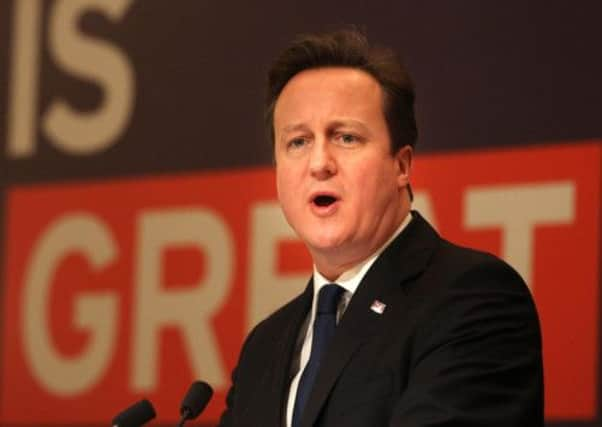Sweep away barriers, Cameron tells India as he bats for Britain


Mr Cameron said Britain was “incredibly welcoming” to inward investment by Indian firms in historic names like Jaguar and Tetley Tea, and was making it easier for Indian business people and students to come to the UK.
But he said the process must “go both ways” and called on Delhi to sweep away barriers to trade which he said were antiquated and were holding back development in the country.
Advertisement
Hide AdAdvertisement
Hide AdMr Cameron has made developing trade with new economic powers like India a key foreign policy priority since coming to power in 2010.
And his decision to assemble the largest trade delegation ever to travel with a Prime Minister was a signal of his intent, as was his decision to return to India for the second time in just two and a half years in office.
But he also took time out to take part in a game of cricket with local youngsters and talk about his plans to enjoy a Kerala fish curry and watch Bollywood movies on his flights.
Speaking on the first day of his visit, Mr Cameron revealed he was talking to the government in New Delhi about the prospects for a “corridor of development” between Mumbai and Bangalore, featuring new towns and infrastructure, which could provide opportunities for British planners, architects, construction firms and private finance experts. Britain could provide £m in funding for a feasibility project for the scheme.
Advertisement
Hide AdAdvertisement
Hide AdHe announced the introduction of a new “same-day” visa service for Indian business people in response to unhappiness with the current system which can take three days or more to process applications.
And he said there was “no limit” to the number of Indians who would be allowed to study at UK universities and stay on in graduate-level jobs after they qualified.
Speaking to workers at the Mumbai headquarters of the Anglo-Dutch Unilever group, Mr Cameron said: “Britain is one of the most open, easy-to-invest-in countries in the world. We are incredibly welcoming.
“I am very proud of the fact that it is an Indian company, Tata, that makes the Jaguars and Land Rovers that are taking the world by storm. They also roll most of our steel and own Tetley Tea – and you don’t get any more British than Tetley Tea.
Advertisement
Hide AdAdvertisement
Hide Ad“Britain is an open economy and we encourage that investment.
“I think, in return, we should be having a conversation about opening up the Indian economy, making it easier to do business here, allowing insurance and banking companies to do more foreign direct investment into the Indian economy.
“There are still many rules and regulations in the Indian economy associated with how you did things in the past which, if you change them, will make your economy grow and deliver more jobs, more wealth, more prosperity across your country.”
Mr Cameron is accompanied on his three-day trip by representatives not only of major corporations like BP, BAE Systems and Rolls-Royce, but also small businesses and academic institutions, as well as football’s Premier League, the London Underground and nine parliamentarians.
Advertisement
Hide AdAdvertisement
Hide AdHe told his audience in Mumbai: “Britain wants to be your partner of choice. We think there are huge ties of history and language and culture and business, but we think we have only just started on the sort of partnership we could build.”
But he was foxed by a question put to him by a worker at Unilever, who asked him which of the company’s products he most enjoyed.
Unilever produces some of Britain’s best known brands, from Marmite to Persil washing powder, Dove soap and Hellman’s mayonnaise.
But either out of diplomacy, forgetfulness or reluctance to bestow a prime ministerial endorsement on a commercial brand, Mr Cameron failed to come up with a name.
“I’m going to do that thing politicians always do when they get a really tough one – and dodge the question,” he said.